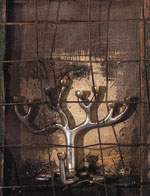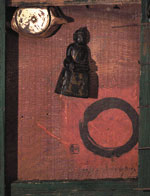
|
|
|
Whatever Happened to Religion On Campus? Everything! (cont'd) |
|
Practicing a faith "might be that one quiet moment away from the chaos," conceded junior Jennifer Miller, co-chair of Oberlin Interfaith Community, founded last year. "I'm in my Oberlin bubble, so it's hard to say. From the real world, my escape is college. From college, my escape is church." Miller, of New York, had an eye-opening experience during her freshman year, when she attended a national conference titled "Religious Pluralism, Spirituality and Higher Education," the inaugural event of Wellesley College's Education and Transformation Project. Oberlin was one of 250 schools to send a group. She was impressed by the school's seven-year-old Office of Spiritual and Religious Life, headed by a separate dean and supported by teams of students, chaplains, and advisors. Nearly a dozen religious traditions are represented, including Baha'i, Buddhist, Native African, Native American, Pagan, Sikh, and Zoroastrian. Services are available to faculty and the community as well as to every interested student. "I found out we're not so diverse as we thought we were, and I remember thinking, 'Yes, but we're Oberlin.' But some of the other schools did offer more, said Miller, whose group made the trip on behalf of Oberlin's Middle Eastern students and others practicing underrepresented religions, "the ones quietly finding their own space." Miller, a Catholic, is involved with three of Oberlin's student religious organizations. "That would have surprised me in high school," she said. "But I'm different here. I think more about what I believe in. I take more ownership. Now, it's a choice to go to Mass, which at Newman we help plan, and not a family decision. People are drawn here because there is a place for everybody," she said. "This (embracing religious pluralism) is one of the true tests." But while Miller is one of several students who said they would like to see more support from the administration, no one has a handle on what form it should take--a program like Wellesley's, more advisors of various faiths, more meeting space. Oberlin Interfaith Community is still "trying to get a picture of who is practicing what, and what they need," Miller said. "Some are happy practicing on their own. Some don't want a place on campus, and we have to respect that, but the situation changes every year." "Our official-group status allows us to apply for money, but we don't need money," said sophomore Anne Royer of Oberlin Young Friends. "We have dinners, but all we really need is room to meet. We're having trouble with meeting space, a problem we haven't had for years." The Quaker community has grown, she believes, "because we've gotten a lot of people in our group just looking for a different way to go." Oberlin's Society of Friends includes community members; the Young Friends group, chartered last year, is for students. A Friends meeting is not a service per se, but an hour of silent worship broken by a "clerk." The faith appeals to those uplifted by the meeting's meditative form and inspired by the Friends' tradition of service to the community. It is pleasant to be a Quaker on campus because, as one student explained, "it's progressive, peace-y, Oberlin-y." Also appealing, according to Royer, is the open-mindedness. "This is a community where you can share your spirituality without being told what to believe. I think there's more of an urge to break with your faith if the structure is restrictive." Oberlin's Pagan Awareness Network attracts seekers for the same reason. "Obviously, for everyone it's different, but from what I've read and my own experience, a lot of people have trouble finding their spirituality in the religion they grew up in," said Joe Adriano, a former Catholic who describes himself as an agnostic pagan. "We get people who come to our group from so many backgrounds," he said. "Christian, Jewish, atheist. It's very comfortable to be pagan in Oberlin." That wasn't always the case, and Adriano said his experiences--he has been asked more than once if pagans sacrifice animals--have made him more understanding. "People here don't seem to have faith in traditional religions," Adriano said. "In Oberlin, 'religious' is a minority class in a way. So the most important thing is that everybody respect everybody else's way of finding spirituality. If you take that away, you're undermining everything." Emily Lane, like most of the other seniors involved in student religious organizations, has observed religious life in Oberlin long enough to sense the shift. Lane, whose father is an Episcopal minister, co-leads Oberlin Christian Athletes and is also active in Unity, an umbrella organization that encourages the school's religious groups to work together on events. "Our group alone has grown and OCF (Oberlin Christian Fellowship) has also increased," she said. Since her freshman year, the organizations have welcomed more younger members and more who attend regularly. "A few years ago when I arrived, people looked at Christians as historical tyrants, so you didn't talk about religion much because you didn't know what kind of reaction you'd get," she said. "The Christian groups then were really splintered and losing membership. We are doing more to attract students--coffee houses, parties, Christian bands--but it's not only that. This seems to fulfill a need for them that they can't fill anywhere else." Exposure to so many faith traditions has enriched her spiritual life, said Lane. "My religious experience at Oberlin has been an integral part of my college experience. Looking back, I can't imagine what college would have been like without that." Yet faith as a subject is popular. Oberlin's department of religion claims the highest enrollment per-professor among the humanities and graduates about 35 majors each year. Most students taking classes are not religion majors, department chair Grover Zinn pointed out. "I do see a greater interest in religion as an experience, not just as an abstract idea, and some students are interested on both a personal and an academic level," he said. "We have people in classes now actively discovering the roots of their Catholicism. We want to help people understand the traditional religions of the world from the aspect of academic study," he said. "But there is nothing to preclude anyone from enriching one's own personal religious life." Aaron Rester, who graduated last year and plans to enter the University of Chicago's Divinity School this fall, said he has seen the academic study of religion and the social experience of being religious at Oberlin both shake and strengthen faith. "My sense is that people come to class with certain religious views," said Rester, who designed his own major in comparative mythology. "Some emerge grounded, with a better understanding of how they developed their views. Others are left with the angst of pondering the authenticity of suppressed Gospels. But, definitely, there are certain religions in vogue here--paganism and Eastern religions--although not so much as in the '60s and '70s." "I don't see any difference now from how it has been," said Rev. Steve Hammond, pastor of Oberlin's First Baptist Church, who, with his minister wife, Mary, is a Protestant chaplain affiliate at the school. "When I arrived 20 years ago, I was told there wasn't much of a religious presence here, but I didn't find that to be true. It's just easy for religious people to keep kind of a low profile." Michele Lesie is a freelance writer who formerly worked as a journalist for Cleveland's Plain Dealer. |
 THE
RENEWED INTEREST IN RELIGION AND SPIRITUALITY ON CAMPUSES, MOST
STUDENTS AGREED, IS NOT A REACTION TO THE WORLD OUTSIDE, to violence,
disintegrating family structure, overwhelming responsibilities,
to any of the things driving the previous generation back to their
childhood faiths, or to the new "mega-churches." For the younger
group, the siren is from within.
THE
RENEWED INTEREST IN RELIGION AND SPIRITUALITY ON CAMPUSES, MOST
STUDENTS AGREED, IS NOT A REACTION TO THE WORLD OUTSIDE, to violence,
disintegrating family structure, overwhelming responsibilities,
to any of the things driving the previous generation back to their
childhood faiths, or to the new "mega-churches." For the younger
group, the siren is from within.  "OBERLIN
WILL EITHER STRENGTHEN YOUR FAITH OR BREAK IT" SAID ONE STUDENT.
And
while it's true that no one alights on this campus because it's
a fine place to practice rituals, "people do want to be public
about their faith," he said. "It is much easier to be a Buddhist
here than a denominational Christian. On this campus, race and
ethnicity are more analyzed, more on the public agenda than religion,
even among those people who are being analyzed."
"OBERLIN
WILL EITHER STRENGTHEN YOUR FAITH OR BREAK IT" SAID ONE STUDENT.
And
while it's true that no one alights on this campus because it's
a fine place to practice rituals, "people do want to be public
about their faith," he said. "It is much easier to be a Buddhist
here than a denominational Christian. On this campus, race and
ethnicity are more analyzed, more on the public agenda than religion,
even among those people who are being analyzed."